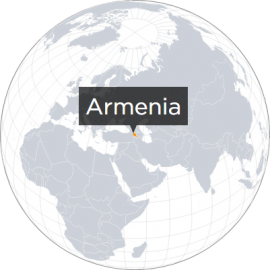| Central African Republic: Towards a roadmap to Peace and Prosperity Published March 2022 Download the report. | |
Central African Republic: Towards a Roadmap to Peace and Prosperity

Our research indicates that a pathway to prosperity in the Central African Republic requires a single-minded focus on peace, including a nationwide ceasefire, decentralisation of foreign assistance resources and greater autonomy for the regions.
The Legatum Institute’s mission is to create a global movement of people committed to creating the pathways from poverty to prosperity and the transformation of society. Our research work is focused on understanding how prosperity is created, and to that end, with the generous support of the Templeton World Charitable Foundation, we have published a Global Index of Economic Openness to rank countries’ ability to interact with, and benefit from, both domestic and international commerce.
This CAR study is one of a number of in-depth reports that analyse an individual country’s performance on the key characteristics of inclusive societies, open economies, and empowered people.
You can download the full report here.
Download here the article Central African Republic Matters: Changes needed to build peace by Louisa Lombard (Yale University) and Carlos Montes (Legatum Institute). Read the french version here
The Central African Republic ranks 166th out of 167 countries in the Legatum Prosperity Index.TM Its pathway to prosperity is a difficult one. For decades the political competition in the country has been carried out through conflict, extreme violence, and the “raiding” of other groups’ resources. Hence, a viable political settlement has not emerged, hindering prosperity.
The State – unitary in name only – does not generally control most of the national territory or fulfil its normal functions. This matters since CAR has become the second-poorest country in the world with one of the most unequal wealth distributions, a third of its population displaced and two thirds in need of humanitarian assistance. Yet the country is largely ignored by the international media and global public opinion. Nevertheless, it receives substantial foreign assistance and large UN-mandated military support (MINUSCA) – ‘world champion’ of peacekeeping missions. It is situated in the most fragile region of the world and has become a base for Russian Wagner Group mercenaries.
International partners have supported the idea of a unitary state and the Government in Bangui, with aspirations of it becoming the ‘ideal’ state. This approach has contributed to a concentration of resources in the capital as opposed to developmental support throughout the country. Because peace processes and agreements are Bangui-focussed, these assistance programmes have not managed to address the drivers of conflict, particularly access to local resources.
This report seeks to identify a solution that would ultimately allow for the creation of a pathway to prosperity. It would involve a change from the current status quo, facilitating a cease fire and a peacebuilding process. We argue that this solution presents a realistic opportunity for conciliation, a de-escalation of violence that would lead to national transformation. This process would also require international development partners to act in unison, with the main aim of creating incentives for peace building. They could contribute in their capacity to coordinate effective UN military support – a strengthened MINUSCA force would make peace a more attractive option. Furthermore, they could support local development through reallocation of large foreign assistance budgets and resources in areas outside of Bangui using a stability fund.
In addition, this report outlines some of the principles, policies, and practices that a locally based peacebuilding programme supported by a stability fund could include. The roadmap outlines a conciliation process that respects local tradition and culture, the needs of individual ethnic and social groups and which re-allocates access to resources. With greater peace, attention could be focussed on the immediate drivers of economic and social wellbeing of the people of the country.
We hope that this report contributes to a greater understanding of the suffering and plight of the people in Central African Republic and that it is paramount for policymakers around the world to think constructively in their contributions to real solutions that can tackle these problems. Local solutions are complex and do not contain all the answers, but central plans and an idealised unitary State model have not been effective. If nothing changes, it is likely that even higher levels of violence will ensue in already the most fragile neighbourhood in the world. The proposed changes create an opportunity for the Central African Republic people and their leaders to gain more agency over their lives in a more peaceful environment, offering a platform from which they can develop their own prosperity.
To learn more, you can read the full report here.
| Central African Republic matters: Changes needed to build peac Authors: Louisa Lombard Carlos Montes Download the article | |
| La République Centrafricaine compte: Les changements requis pour construire la paix Auteurs: Louisa Lombard Carlos Montes Télécharger l'article | |




